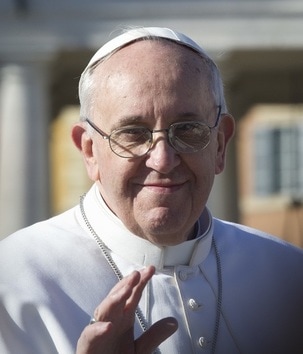
His Holiness Pope Francis has invited Christians to add two new items to the traditional 14 spiritual and corporal works of mercy to combat ecological destruction and global warming.
In a message for the World Day of Prayer for the Care of Creation, Pope Francis said Christians should consider adding “care for our common home” to the traditional set of works first described by Jesus as part of the criteria used to determine who will go to Heaven.
The pope also called on individuals in the various countries of the world to push their governments to make good on recent international agreements aimed at halting the warming of the atmosphere and encouraging sustainable development.
The works of mercy, normally listed as seven corporal and seven spiritual directives, were first taken from Jesus' words in Matthew's Gospel, when he says the ones who enter Heaven will be those who have given food to the hungry and drink to the thirsty, and have clothed the naked and sheltered the homeless.
Repeating his call from his June 2015 ecological encyclical Laudato Si’, Pope Francis said: 'If we look at the works of mercy as a whole, we see that the object of mercy is human life itself and everything it embraces. Obviously "human life itself and everything it embraces" includes care for our common home.'
The Pope added: 'Human beings are deeply connected with all of creation. When we mistreat nature, we also mistreat human beings.' It was time, he said, for humanity to 'repent of the harm we are doing to our common home'.
He continued: 'So let me propose a complement to the two traditional sets of seven: may the works of mercy also include care for our common home.
'As a spiritual work of mercy, care for our common home calls for a "grateful contemplation of God’s world" which "allows us to discover in each thing a teaching which God wishes to hand on to us".
'As a corporal work of mercy, care for our common home requires "simple daily gestures which break with the logic of violence, exploitation and selfishness" and "makes itself felt in every action that seeks to build a better world".'
For more information, visit the story on National Catholic Reporter.
In a message for the World Day of Prayer for the Care of Creation, Pope Francis said Christians should consider adding “care for our common home” to the traditional set of works first described by Jesus as part of the criteria used to determine who will go to Heaven.
The pope also called on individuals in the various countries of the world to push their governments to make good on recent international agreements aimed at halting the warming of the atmosphere and encouraging sustainable development.
The works of mercy, normally listed as seven corporal and seven spiritual directives, were first taken from Jesus' words in Matthew's Gospel, when he says the ones who enter Heaven will be those who have given food to the hungry and drink to the thirsty, and have clothed the naked and sheltered the homeless.
Repeating his call from his June 2015 ecological encyclical Laudato Si’, Pope Francis said: 'If we look at the works of mercy as a whole, we see that the object of mercy is human life itself and everything it embraces. Obviously "human life itself and everything it embraces" includes care for our common home.'
The Pope added: 'Human beings are deeply connected with all of creation. When we mistreat nature, we also mistreat human beings.' It was time, he said, for humanity to 'repent of the harm we are doing to our common home'.
He continued: 'So let me propose a complement to the two traditional sets of seven: may the works of mercy also include care for our common home.
'As a spiritual work of mercy, care for our common home calls for a "grateful contemplation of God’s world" which "allows us to discover in each thing a teaching which God wishes to hand on to us".
'As a corporal work of mercy, care for our common home requires "simple daily gestures which break with the logic of violence, exploitation and selfishness" and "makes itself felt in every action that seeks to build a better world".'
For more information, visit the story on National Catholic Reporter.

 RSS Feed
RSS Feed
